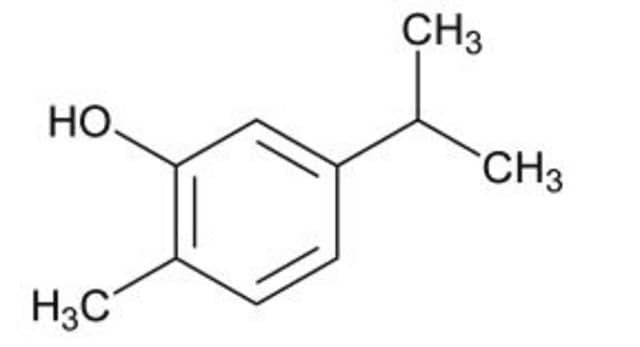42632
Carvacrol
analytical standard
Synonyme(s) :
5-Isopropyl-2-methylphenol
About This Item
Produits recommandés
Qualité
analytical standard
Niveau de qualité
Pureté
≥98.0% (GC)
Durée de conservation
limited shelf life, expiry date on the label
Technique(s)
HPLC: suitable
gas chromatography (GC): suitable
Indice de réfraction
n20/D 1.522 (lit.)
n20/D 1.524
Point d'ébullition
236-237 °C (lit.)
Pf
3-4 °C (lit.)
Densité
0.976 g/mL at 20 °C (lit.)
Application(s)
cleaning products
cosmetics
flavors and fragrances
food and beverages
personal care
Format
neat
Température de stockage
2-8°C
Chaîne SMILES
CC(C)c1ccc(C)c(O)c1
InChI
1S/C10H14O/c1-7(2)9-5-4-8(3)10(11)6-9/h4-7,11H,1-3H3
Clé InChI
RECUKUPTGUEGMW-UHFFFAOYSA-N
Vous recherchez des produits similaires ? Visite Guide de comparaison des produits
Description générale
Application
Conditionnement
Autres remarques
Clause de non-responsabilité
Mention d'avertissement
Danger
Mentions de danger
Classification des risques
Acute Tox. 4 Oral - Aquatic Chronic 2 - Eye Dam. 1 - Skin Corr. 1B
Code de la classe de stockage
8A - Combustible corrosive hazardous materials
Classe de danger pour l'eau (WGK)
WGK 3
Point d'éclair (°F)
>212.0 °F
Point d'éclair (°C)
> 100 °C
Faites votre choix parmi les versions les plus récentes :
Déjà en possession de ce produit ?
Retrouvez la documentation relative aux produits que vous avez récemment achetés dans la Bibliothèque de documents.
Les clients ont également consulté
Notre équipe de scientifiques dispose d'une expérience dans tous les secteurs de la recherche, notamment en sciences de la vie, science des matériaux, synthèse chimique, chromatographie, analyse et dans de nombreux autres domaines..
Contacter notre Service technique








